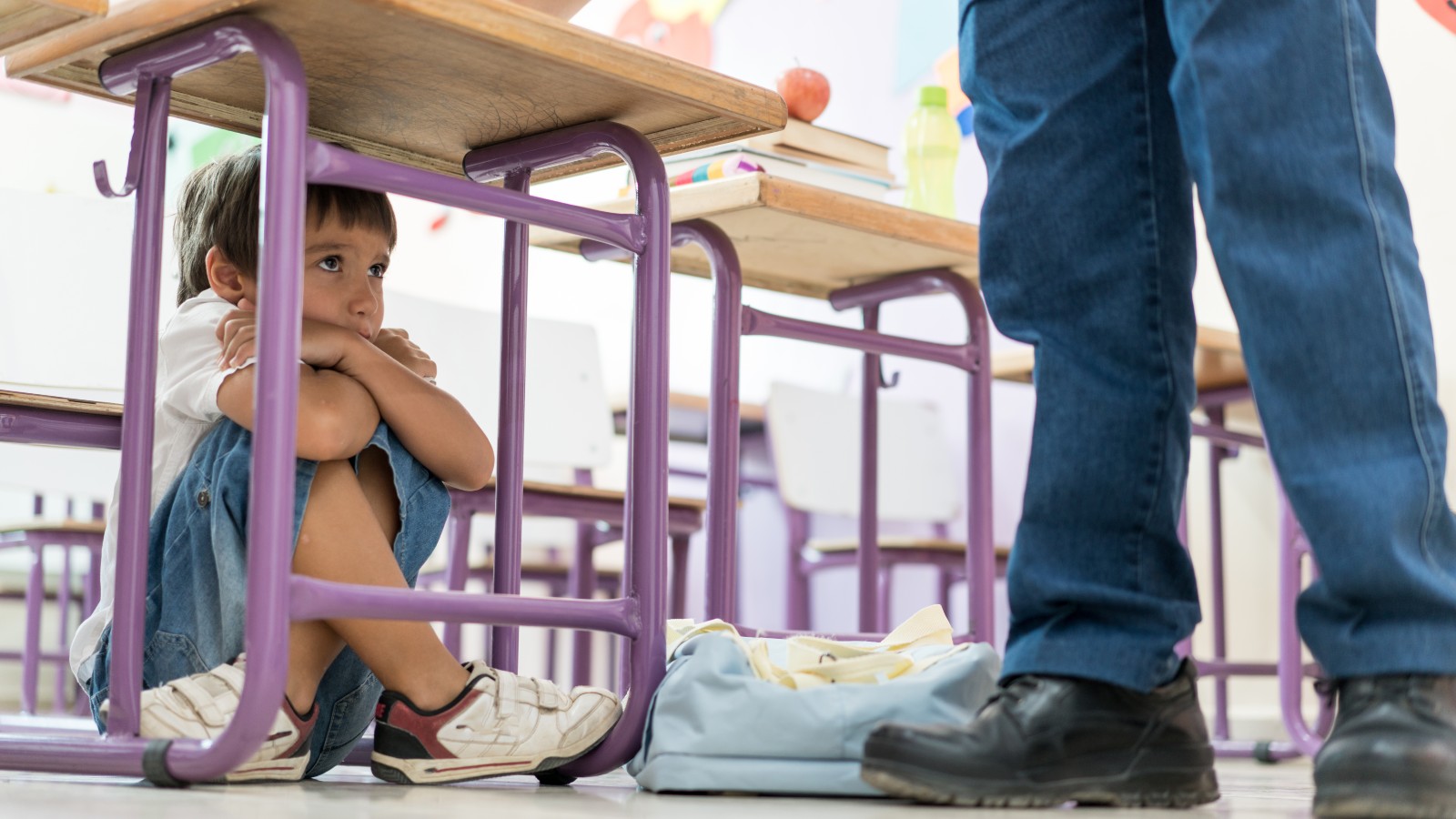What is the back to school necklace? Its very dark meaning


Parenting advice, hot topics, best buys and family finance tips delivered straight to your inbox.
You are now subscribed
Your newsletter sign-up was successful
Preparing for the new school term can be daunting for any parents who feel under pressure to ensure their child or children have all the correct uniform and essentials.
But for a child struggling in silence, a return to the classroom after the summer holidays can feel much worse.
Many school-age youngsters are filled with back-to-school dread that is so intense that if left unspoken, it can lead to child suicide.
What's trending on social media can be a good starting point for discovering what matters to youngsters and while talking about their mental health isn't as uncommon today as it was in years gone by, there is still a long way to go.
TikTok and Twitter has got pre-teens and teenagers talking about the 'back to school necklace' - and while at first glance, parents might dismiss it for being another must-have accessory, it actually has a much darker meaning that shouldn't be ignored because talking about it, could actually end up saving a child's life.
What is the 'back-to-school necklace'?
Urban Dictionary - a website dedicated to defining new slang words - explains, 'A back to school necklace is another name for a noose. This is due to the utter despair you feel when school starts back up again.'
One Twitter user posted a photo and captioned it, 'Currently making my back to school necklace !!'
Parenting advice, hot topics, best buys and family finance tips delivered straight to your inbox.
And for some children, the pressure - whether from schoolwork, their peers or family life - is often too much to cope with.
Around seven percent of UK children have attempted suicide by the age of 17, according to a study in the British Journal of Psychiatrystatistics published by The Guardian back in February this year.
It also highlighted that almost one in four say they have self-harmed in the past year, and experts say the figures could rise as a result of the pandemic.
Dr Malie Coyne, a Clinical Psychologist and author of ‘Love in, Love out: A compassionate approach to parenting your anxious child’, was shocked to learn about the trend.
"The 'back-to-school necklace' trend really shocked me because I have a nearly eight and a nearly 10-year-old daughter but I think it’s really important as a parent to have the language of feelings at home - where feelings are discussed and they’re validated. But parents should encourage their children to talk about their feelings to do with everything - not just going back to school.'
She continued, 'If you're worried about the back-to-school necklace trend you can say ‘Oh I’ve read about this in the paper, have you heard about it?' but you don’t need to bring that specific thing up unless you’re concerned about your child. And if you are concerned, talking to a child about that isn’t going to make them suicidal.'
But Dr. Coyne explained the importance of using the right technique. She said, "When your child tells you about something rather than gloss over it or to distract away from it, really validate their feeling and say ‘that sounds like it was really difficult for you today.’"
And she explained how best to approach talking to them about their mental health if they aren't as forthcoming with their feelings but you have noticed tell-tale signs. "If you feel that they might be anxious about going back to school or depressed or low, you can say to your child ‘I’ve noticed that you’ve been a little bit different lately or that you’ve been spending more time in your room. Tell them what you’ve noticed, rather than in an accusatory way ‘you’ve been doing this’."
She highlighted that parents tend to under parent over 10-year-olds and over parent the under 10s and therefore a different approach is needed for both age groups. Dr. Coyne explained, "When teens tell us to ‘Go away’ it doesn’t always mean that they want us to leave them alone. They might just be having a bad day and we need to let them know we are still there for them and check in on them regularly. You could say “You’d like to be alone for a bit which is fine but I’ll be checking in a bit later as it looks like you’re finding things a bit tough today” and do check-in. Keep checking in. They need you now as much as they ever did, maybe even more. Teens tend to be better at side-to-side communication on walks or in the car, and brief chats rather than lengthy ones."

If your child fears school in the way as the 'back-to-school necklace' meaning, she advises parents to "unpack" what it is that their child fears about school.
She continued, 'If they’re saying I don’t want to go to school they are obviously having very black and white thinking. You’re trying to unpack what it is about school that’s making them upset, the most important is to focus on calming them down and try to keep your cool. Anxiety is contagious, if you don’t keep your cool then your child won't either.'
And for any parents concerned that there is a pattern to their child's absences, Dr. Coyne explains how to deal with it. "Obviously, if they are ill you’ll be taking them to the GP. But I wouldn’t be letting your child watch TV or be on a screen all day if they’re home from school because then there is no reason for them to go to school. If they’re ill they’re ill and they will stay in bed for part of the day.
'You could also, with the child's permission, check-in with the child’s friends, other parents and the school to see how they are getting on,' she added.
Getting to the bottom of what is causing their behaviour is key to resolving a happy school environment and as Dr. Coyne warned, "You don’t want a child to spend a long time out of school because that is going to be harder for them to go back."
How to spot if a child is suffering from mental health?
Dr. Coyne listed her key factors that indicate a child is suffering in silence:
- Any type of change in a child’s communication, are they withdrawing from social contact? Or spending more time in their rooms than before?
- Do they want to be on their own a lot?
- Are they on a screen a lot?
- Mood swings.
- Use of alcohol or drugs.
- Feelings of hopelessness.
- Not participating in things they used to.
- Not having enjoyment in life.
- Is their eating or sleeping routine out of sync?
- They might be engaging in risky behaviours or giving away their belongings or saying I won’t be around much longer’.
- You might also be looking out for signs of self-harm.
- Trust your intuition.
And even youngsters themselves are shocked to learn the term. One uploaded a trend that called on others to 'Record yourself before and after googling 'back to school necklace' and his reaction can be seen in the clip below...
https://www.youtube.com/watch?v=7k9WgOWOec8
Whether your child has siblings or just friends, Dr Coyne stressed the importance of all children looking out for one another.
She explained, "It’s really important to get kids and siblings to look out for each other. And with that, you’re trying to promote kindness and empathy. When you notice them being caring you can say 'that was really nice how you helped your sister', or '....gave her a hug' rather than focus on them arguing.
And she even puts her own advice into practice. "I’m even saying to them now, 'when you go out into town with your friends I want you to look out for each other and I want you to look out for your friends too - and don’t let them do home alone. Make sure that you’re with them and looking out for each other because it’s really important."
If you are concerned about your teenager, let them know your concerns and encourage them to talk to someone they trust. If your teen may be at risk of harming themselves, contact your GP or a health professional for immediate advice.
Samaritans are available 24-hours/7 days a week, call 116 123 or Text SHOUT to 85258.
The following apps are good for managing child anxiety – Headspace (for kids), Stop, Breathe, and Think Kids and Smiling Mind.
You can also visit A Lust for Life for additional resources.
To coincide with World Suicide Prevention Day (10th of September), suicide prevention charity R;pple has launched a new online tool to protect children from harmful content. After identifying keyword searches relating to self-harm or suicide, it will automatically display a range of mental health helplines and guidance instead. This includes call, text, webchat, self-help app, pocket resources – for free, 24/7. The browser extension is free to download and available now.

Selina is a Senior Family Writer for GoodtoKnow and has more than 16 years years of experience. She specialises in royal family news, including the latest activities of Prince George, Charlotte, Louis, Archie and Lilibet. She also covers the latest government, health and charity advice for families. Selina graduated from the University of Sheffield in 2006 with a degree in Journalism, and gained her NCTJ and NCE qualifications. During her career, she’s also written for Woman, Woman's Own, Woman&Home, and Woman's Weekly as well as Heat magazine, Bang Showbiz - and the Scunthorpe Telegraph. When she's not covering family news, you can find her exploring new countryside walking routes, catching up with friends over good food, or making memories (including award-winning scarecrows!)